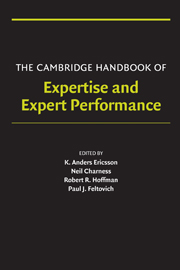Book contents
- Frontmatter
- Contents
- Acknowledgments
- Contributors
- PART I INTRODUCTION AND PERSPECTIVE
- PART II OVERVIEW OF APPROACHES TO THE STUDY OF EXPERTISE – BRIEF HISTORICAL ACCOUNTS OF THEORIES AND METHODS
- PART III METHODS FOR STUDYING THE STRUCTURE OF EXPERTISE
- PART IV METHODS FOR STUDYING THE ACQUISITION AND MAINTENANCE OF EXPERTISE
- PART V DOMAINS OF EXPERTISE
- PART V.A PROFESSIONAL DOMAINS
- PART V.B ARTS, SPORTS, & MOTOR SKILLS
- PART V.C GAMES AND OTHER TYPES OF EXPERTISE
- 30 Expertise in Chess
- 31 Exceptional Memory
- 32 Mathematical Expertise
- 33 Expertise in History
- PART VI GENERALIZABLE MECHANISMS MEDIATING EXPERTISE AND GENERAL ISSUES
- Author Index
- Subject Index
- References
31 - Exceptional Memory
from PART V.C - GAMES AND OTHER TYPES OF EXPERTISE
- Frontmatter
- Contents
- Acknowledgments
- Contributors
- PART I INTRODUCTION AND PERSPECTIVE
- PART II OVERVIEW OF APPROACHES TO THE STUDY OF EXPERTISE – BRIEF HISTORICAL ACCOUNTS OF THEORIES AND METHODS
- PART III METHODS FOR STUDYING THE STRUCTURE OF EXPERTISE
- PART IV METHODS FOR STUDYING THE ACQUISITION AND MAINTENANCE OF EXPERTISE
- PART V DOMAINS OF EXPERTISE
- PART V.A PROFESSIONAL DOMAINS
- PART V.B ARTS, SPORTS, & MOTOR SKILLS
- PART V.C GAMES AND OTHER TYPES OF EXPERTISE
- 30 Expertise in Chess
- 31 Exceptional Memory
- 32 Mathematical Expertise
- 33 Expertise in History
- PART VI GENERALIZABLE MECHANISMS MEDIATING EXPERTISE AND GENERAL ISSUES
- Author Index
- Subject Index
- References
Summary
Historical Introduction
Interest in improving methods of memorizing has a long history. Before the widespread use of writing, poets and storytellers devised methods of making memorization and recall easier, using rhythm, imagery, and formulaic descriptions (Rubin, 1995). Non-experts, too, had to rely far more heavily on oral memory than in modern times.
Today equally impressive feats of memory are demonstrated regularly by experts in specific fields of knowledge (chess, music, medicine, literature, law, football, etc.), which embody far more information than was available to our ancestors. As with the poets and storytellers of an earlier age, long and varied exposure, together with motivation to achieve mastery, have enabled these experts to build up a body of information that makes new additions easier by embedding them in an already organized structure, often without conscious effort. Such an organized database is known as semantic memory and depends on the progressive addition and organization of material acquired over a lengthy period.
The focus of this chapter, however, is on individuals who display an unusual ability to memorize information, especially ability to memorize types of information that present particular difficulty for the majority, such as lists of numbers with no inherent structure. This form of expertise involves episodic memory, the ability to reproduce a prior input, event, or episode. Superior ability to retain episodic information will undoubtedly facilitate the development of semantic memory, but is probably not essential to it.
- Type
- Chapter
- Information
- The Cambridge Handbook of Expertise and Expert Performance , pp. 539 - 552Publisher: Cambridge University PressPrint publication year: 2006
References
- 5
- Cited by

